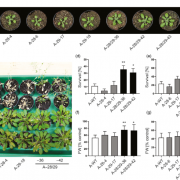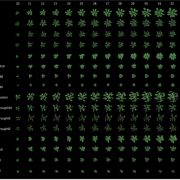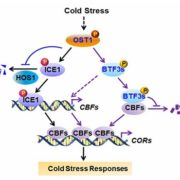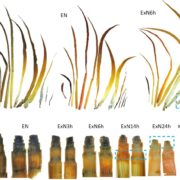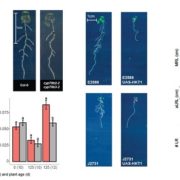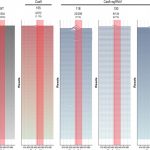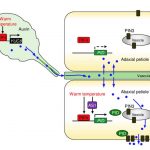A mobile auxin signal connects temperature sensing in cotyledons with growth responses in hypocotyls (Plant Phys)
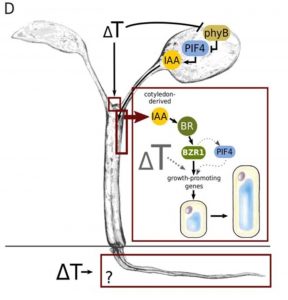 An increase in ambient temperature affects plant growth and development; for instance, high temperatures trigger elongation in petioles, hypocotyls, and roots in Arabidopsis seedlings. Bellstaedt et al. studied the spatial relationships in sensing, signaling and growth responses to high temperature in these tissues. The first clue about organ-specific processes came from the transcriptomic analysis when they identified differential expression of hormone-response genes in cotyledon vs root samples. The authors focused on auxin as a signal, since previous reports indicate PIF4 (PHYTOCHROME-INTERACTING FACTOR 4, a thermomorphogenesis-signaling hub), induces auxin biosynthesis genes, and mutants affected in the production (yuc1-D) or transport (pin) of auxins showed altered response to hypocotyl elongation in high temperatures. They dissected tissues and analyzed the individual response of hypocotyls and roots. Detached roots elongated in response to high temperatures, but hypocotyls did not show the thermomorphogenic response. The crucial role of auxin was further confirmed with the application of an auxin transporter inhibitor (NPA), which caused the same effect of the cotyledon detachment. Additional players in this process involve components of the brassinosteroid signaling pathway. The authors conclude that cotyledons sense high temperatures and generate an auxin signal that is translocated to the hypocotyls where it triggers cell elongation. (Summary by Humberto Herrera-Ubaldo) Plant Phys. 10.1104/pp.18.01377
An increase in ambient temperature affects plant growth and development; for instance, high temperatures trigger elongation in petioles, hypocotyls, and roots in Arabidopsis seedlings. Bellstaedt et al. studied the spatial relationships in sensing, signaling and growth responses to high temperature in these tissues. The first clue about organ-specific processes came from the transcriptomic analysis when they identified differential expression of hormone-response genes in cotyledon vs root samples. The authors focused on auxin as a signal, since previous reports indicate PIF4 (PHYTOCHROME-INTERACTING FACTOR 4, a thermomorphogenesis-signaling hub), induces auxin biosynthesis genes, and mutants affected in the production (yuc1-D) or transport (pin) of auxins showed altered response to hypocotyl elongation in high temperatures. They dissected tissues and analyzed the individual response of hypocotyls and roots. Detached roots elongated in response to high temperatures, but hypocotyls did not show the thermomorphogenic response. The crucial role of auxin was further confirmed with the application of an auxin transporter inhibitor (NPA), which caused the same effect of the cotyledon detachment. Additional players in this process involve components of the brassinosteroid signaling pathway. The authors conclude that cotyledons sense high temperatures and generate an auxin signal that is translocated to the hypocotyls where it triggers cell elongation. (Summary by Humberto Herrera-Ubaldo) Plant Phys. 10.1104/pp.18.01377


